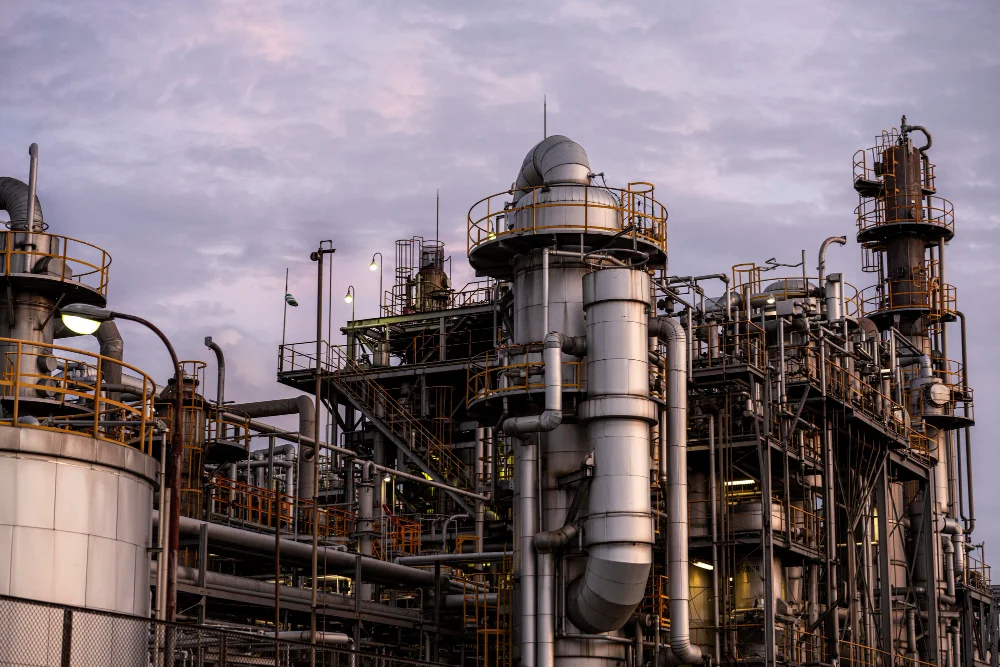Petroleum refining is a complex process that involves handling various chemical fluids. Efficient management of these fluids is crucial for ensuring safety, minimizing environmental impact and optimizing refinery operations.
The refining process is complex and involves a variety of steps, including:
Distillation: Crude oil is heated and vaporized, and the vapors are then condensed into different fractions based on their boiling points.
Conversion: The different fractions are then converted into more useful products, such as gasoline, diesel fuel, and jet fuel.
Treatment: The converted products are then treated to remove impurities and improve their quality.
Efficient chemical fluid handling pump is essential for the petroleum refining process. The ability to safely and efficiently transport & store the different chemical fluids involved in the process is critical to the success of the refinery.
Factors Contributing Efficient Fluid Handling
There are a number of factors that contribute to efficient chemical fluid handling in a refinery, including:
Right Equipment: The right type of equipment is essential for safely and efficiently transporting and storing chemical fluids. For example, Sulfuric acid pumps are used to circulate the acid within the alkylation unit, ensuring proper mixing and contact between the acid and hydrocarbon feedstock.
Proper Procedures: Proper procedures must be in place to ensure that chemical fluids are handled safely and efficiently. These procedures should cover everything from the loading and unloading of tankers to the storage and disposal of waste.
Training: Personnel who work in a refinery must be trained in the safe handling of chemical fluids. This training should cover everything from the identification of different fluids to the proper use of safety equipment.
Before diving into efficient handling practices, it’s essential to understand the types and characteristics of chemical fluids used in petroleum refining. These fluids can include catalysts, solvents, acids and alkalis, each with unique properties and roles in the refining process. Understanding their behavior, reactivity and potential hazards is vital for safe and efficient handling.
Safety Considerations for Chemical Fluid Handling
Safety should always be the top priority when dealing with chemical fluids in petroleum refining. Implementing proper safety protocols, such as wearing personal protective equipment (PPE) and conducting thorough hazard assessments, is critical. Additionally, establishing clear procedures for spill response, containment, and emergency shutdowns can prevent accidents and protect workers and the environment.
How Do Pumps Handle Chemical Fluids Safely & Efficiently?
Hydrochloric Acid (HCl): Hydrochloric acid is occasionally used in refining processes for descaling or acid cleaning of equipment and pipelines. Pumps designed to handle corrosive fluids like HCl are employed for safe and efficient transport and circulation.
Sulfuric Acid (H2SO4): Sulfuric acid is used in alkylation or catalyst regeneration process. Sulfuric acid pumps are capable of handling corrosive fluids like sulfuric acid for the safe and efficient transport, circulation and mixing of the acid within the refinery.
Phosphoric Acid (H3PO4): Phosphoric acid may be used in specific applications within a refinery such as catalyst preparation. Phosphoric acid pump ensure proper circulation and distribution of the acid during these processes.
Nitric Acid (HNO3): Nitric acid may be encountered in metal surface treatment. Nitric acid pumps are utilized for safe and efficient transport, circulation and distribution of the acid within the refinery.
Best Practices for Safe and Efficient Chemical Fluid Management
To achieve safe chemical fluid management and enhance fluid handling efficiency, refineries can adopt several best practices:
- Design Optimized Flow Paths: Streamlined pipeline design reduces turbulence and energy losses, improving transfer efficiency.
- Use Proper Containment Systems: Secondary containment prevents leaks or spills from contaminating surrounding areas.
- Employ Advanced Dosing and Mixing Technologies: Automated chemical dosing and mixing solutions ensure accurate blending, reducing human error and chemical waste.
- Leverage Automation and AI: Smart pumps and automated systems optimize performance and adjust to changing operating conditions in real time.
- Conduct Regular Safety Drills: Continuous safety training ensures that all workers are prepared to handle emergencies, improving overall plant safety.
Implementing these practices not only enhances productivity but also reinforces a culture of safety and environmental responsibility.
The Importance of Continuous Improvement
The petroleum industry continues to evolve, and so do the challenges associated with handling chemical fluids in petroleum refining. By continuously investing in advanced pump technologies, corrosion-resistant materials, and intelligent monitoring systems, refineries can maintain a competitive edge while ensuring sustainability.
Adopting innovative chemical pump solutions for the petroleum industry allows for greater control, lower operational costs, and enhanced environmental compliance. As a result, refineries can operate more efficiently and safely, achieving higher output with reduced risk.
Conclusion:
Efficient management of chemical fluids is not merely an operational necessity it’s a cornerstone of safety, sustainability, and profitability in the petroleum sector. By combining reliable chemical fluid transfer systems, robust corrosion-resistant pumps, and smart chemical dosing and mixing solutions, refineries can optimize their processes and reduce environmental impact.
Ultimately, handling chemical fluids in petroleum refining requires a balance of technology, training, and safety. Through proactive pump system maintenance in refineries, adherence to best practices, and the adoption of intelligent systems, the petroleum industry can achieve true efficient fluid handling in refineries paving the way for safer, cleaner, and more sustainable refining operations.


Videos